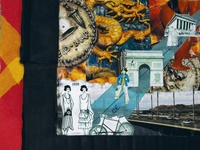Aside from its educational value in her classroom, television provides an escape for Pokrovsky outside of academia. “This is how I regain my sanity,” she says laughing. Some of her favorite shows include “Mad Men,” “The Good Wife,” and any version of “Law and Order.” She watches the programs to relax and be entertained, and she believes that television carries an unwarranted stigma in serious circles. Pokrovsky advocates “responsible television,” which she differentiates from the standard mode of viewing.
BEYOND VEGGING
The impetus to make TV fit academic purposes also functions to revivify the act of watching TV. Visiting Lecturer Maria San Filippo, who works on the faculty at both Harvard University Summer School and Wellesley College, teaches a course called SWGS S-1240: “Women and Television” at the Summer School and “American Television, Culture, & Society” at Wellesley. San Fillipo has a deep belief in TV’s potential.
“By simple fact of its cultural ubiquity and influence, TV deserves our media-literate attention,” she wrote in an email. “Because nearly every student encounters television frequently outside of the classroom, class time serves as an academic version of the office water cooler—the space where we convene to discuss our respective perspectives on everything we’re learning in and about viewing.” The mere fact that we all watch TV is sufficient to justify a critical take on its intrinsic and social meaning.
For San Filippo, the structural limitations intrinsic to TV do not prevent an academic from taking TV seriously. “As someone who also teaches courses on film and literature, I find that television has the advantage of being episodic but the disadvantage of being serial,” she wrote. “Time-wise, it’s easier to view and discuss a TV episode than to screen a film or read a novel, but it’s not ideal that we must contemplate those episodes in isolation.” Serialization, which facilitates fandom for certain shows and therefore profits networks, hinders TV’s pedagogical usefulness, whereas its brevity, another commercial consideration, makes it easier to analyze. In this respect, TV shows’ identity as consumer products is not necessarily a bad thing for academic study.
San Filippo wants her students to realize that television viewing doesn’t have to involve vegging out on the couch and staring at the boob-tube with their mouths open and drool slowly pouring out. “When students tell me that they’ll never watch TV the same way again, I feel I’ve done my job,” Filippo wrote.
“Television studies is still working to achieve the degree of legitimacy that film studies struggled to achieve before it, and that various forms of digital media are also now seeking,” San Filippo wrote. In our country’s history, television has been a form of entertainment, a reason to sit down with loved ones and enjoy a show together, a persistent white noise—but rarely an educational tool.
Much of what makes TV fun—that it may be the most effective way to freeze a specific place and time—may also make it academically efficient. Indeed, TV is a snapshot of whatever cultural moment that produces it. So perhaps now is a good time to propose the independent study, History of American Civilization 259: “‘Jersey Shore’ and its Contributions to the Understanding of Italian-American Young Adults in the Tri-State Area.”
—Staff writer Jenna R. Overton can be reached at jennaoverton@college.harvard.edu.









